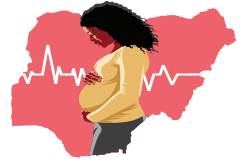Latest Headlines
FOR HEALTHY BEGINNING, HOPEFUL FUTURE

Government must invest more in the health sector
The 2025 World Health Day was celebrated on Monday to mark the beginning of a year-long campaign on maternal and newborn health. Titled, ‘Healthy beginnings, hopeful futures,’ the campaign urges government and other stakeholders in the health sector “to ramp up efforts to end preventable maternal and newborn deaths, and to prioritise women’s longer-term health and well-being.” Unfortunately, the scale of maternal mortality in Nigeria has become very alarming. In its 2023 Progress Report, the World Health Organisation (WHO) revealed that Nigeria accounts for over 34 per cent of global maternal deaths while the lifetime risk of dying during pregnancy, childbirth, postpartum, or after an abortion for a woman is one in 22, compared to one in 4900 in developed countries. No fewer than 40 million women of childbearing age (between 15 and 49 years of age) in Nigeria suffer a disproportional high level of health issues surrounding birth. “While the country represents 2.4 per cent of the world’s population, it currently contributes 10 per cent of global deaths for pregnant mothers,” said UNICEF.
The report ranked Nigeria as accounting for the second-highest number of maternal and child deaths globally, after India. In 2020, according to the report, 788 women and children died ‘per thousand’ in India and 540 women and children ‘per thousand’ died in Nigeria. In the same year, India accounted for 17 per cent of global maternal, and neonatal deaths and stillbirths, while Nigeria accounted for 12 per cent. Unfortunately, many of the rural communities in the 36 states of our country lack cottage hospitals and medical facilities that will address these challenges. Where they exist, they are ill-equipped, and worsened by shortage of manpower. Instances abound of pregnant women who died in the process of commuting from their homes to a medical facility.
Yet, when a pregnant woman avoids prenatal care, she puts herself under the risk of postpartum haemorrhage (PPH), a complication arising from childbirth, which can result in a fatal outcome. Besides, women who do not have access to healthcare are prone to unassisted delivery carried out by quack midwives in unhealthy conditions with dire consequences for both the mother and foetus. To address this serious public health issue, we must begin to examine how to mitigate the acute poverty in the country, especially in the rural areas.
However, we must put the blame on the state governments and the lack of attention by many of them to primary health care system at the grassroots. It is even worse that most of them have rendered prostrate the local government administration in their states, leaving healthcare delivery at that level comatose. The solution therefore goes beyond mere formulation of some policies by the federal government. There should be a framework where states and local governments are held accountable for maternal child health care services in their domains.
We must also find ways to cushion the economic burden on most of the women who dwell in the rural areas, as that has been identified as the reason for their inability to afford quality prenatal and post-natal care. There should be a special focus on maternal, newborn and child health. That many hospitals in the country are without the necessary drugs is a situation that also needs to be redressed. We cannot continue to put the lives of our women at risk. There is an urgent need to go beyond rhetoric and promises, to actionable plans to address all the existing gaps in the primary health sector.
We must end the agony and tears of mothers who carry pregnancy for nine months only to die at the point of delivery.










